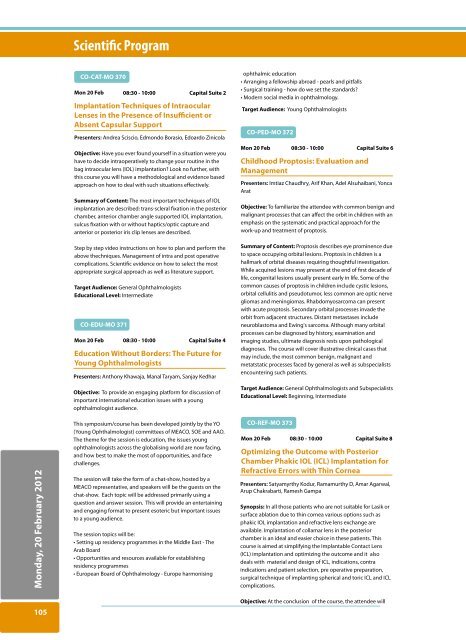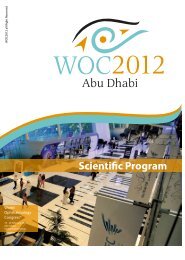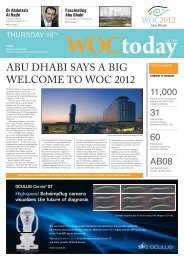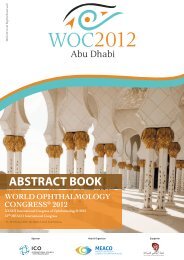ScientiËc Program - WOC2012
ScientiËc Program - WOC2012
ScientiËc Program - WOC2012
Create successful ePaper yourself
Turn your PDF publications into a flip-book with our unique Google optimized e-Paper software.
Scientific <strong>Program</strong><br />
Monday, 20 February 2012<br />
CO-CAT-MO 370<br />
Mon 20 Feb 08:30 - 10:00 Capital Suite 2<br />
Implantation Techniques of Intraocular<br />
Lenses in the Presence of Insufficient or<br />
Absent Capsular Support<br />
Presenters: Andrea Sciscio, Edmondo Borasio, Edoardo Zinicola<br />
Objective: Have you ever found yourself in a situation were you<br />
have to decide intraoperatively to change your routine in the<br />
bag intraocular lens (IOL) implantation Look no further, with<br />
this course you will have a methodological and evidence based<br />
approach on how to deal with such situations effectively.<br />
Summary of Content: The most important techniques of IOL<br />
implantation are described: trans-scleral fixation in the posterior<br />
chamber, anterior chamber angle supported IOL implantation,<br />
sulcus fixation with or without haptics/optic capture and<br />
anterior or posterior iris clip lenses are described.<br />
Step by step video instructions on how to plan and perform the<br />
above thechniques. Management of intra and post operative<br />
complications. Scientific evidence on how to select the most<br />
appropriate surgical approach as well as literature support.<br />
Target Audience: General Ophthalmologists<br />
Educational Level: Intermediate<br />
CO-EDU-MO 371<br />
Mon 20 Feb<br />
08:30 - 10:00 Capital Suite 4<br />
Education Without Borders: The Future for<br />
Young Ophthalmologists<br />
Presenters: Anthony Khawaja, Manal Taryam, Sanjay Kedhar<br />
Objective: To provide an engaging platform for discussion of<br />
important international education issues with a young<br />
ophthalmologist audience.<br />
This symposium/course has been developed jointly by the YO<br />
(Young Ophthalmologist) committees of MEACO, SOE and AAO.<br />
The theme for the session is education, the issues young<br />
ophthalmologists across the globalising world are now facing,<br />
and how best to make the most of opportunities, and face<br />
challenges.<br />
The session will take the form of a chat-show, hosted by a<br />
MEACO representative, and speakers will be the guests on the<br />
chat-show. Each topic will be addressed primarily using a<br />
question and answer session. This will provide an entertaining<br />
and engaging format to present esoteric but important issues<br />
to a young audience.<br />
The session topics will be:<br />
• Setting up residency programmes in the Middle East - The<br />
Arab Board<br />
• Opportunities and resources available for establishing<br />
residency programmes<br />
• European Board of Ophthalmology - Europe harmonising<br />
ophthalmic education<br />
• Arranging a fellowship abroad - pearls and pitfalls<br />
• Surgical training - how do we set the standards<br />
• Modern social media in ophthalmology.<br />
Target Audience: Young Ophthalmologists<br />
CO-PED-MO 372<br />
Mon 20 Feb<br />
08:30 - 10:00 Capital Suite 6<br />
Childhood Proptosis: Evaluation and<br />
Management<br />
Presenters: Imtiaz Chaudhry, Arif Khan, Adel Alsuhaibani, Yonca<br />
Arat<br />
Objective: To familiarize the attendee with common benign and<br />
malignant processes that can affect the orbit in children with an<br />
emphasis on the systematic and practical approach for the<br />
work-up and treatment of proptosis.<br />
Summary of Content: Proptosis describes eye prominence due<br />
to space occupying orbital lesions. Proptosis in children is a<br />
hallmark of orbital diseases requiring thoughtful investigation.<br />
While acquired lesions may present at the end of first decade of<br />
life, congenital lesions usually present early in life. Some of the<br />
common causes of proptosis in children include cystic lesions,<br />
orbital cellulitis and pseudotumor, less common are optic nerve<br />
gliomas and meningiomas. Rhabdomyosarcoma can present<br />
with acute proptosis. Secondary orbital processes invade the<br />
orbit from adjacent structures. Distant metastases include<br />
neuroblastoma and Ewing's sarcoma. Although many orbital<br />
processes can be diagnosed by history, examination and<br />
imaging studies, ultimate diagnosis rests upon pathological<br />
diagnoses. The course will cover illustrative clinical cases that<br />
may include, the most common benign, malignant and<br />
metatstatic processes faced by general as well as subspecialists<br />
encountering such patients.<br />
Target Audience: General Ophthalmologists and Subspecialists<br />
Educational Level: Beginning, Intermediate<br />
CO-REF-MO 373<br />
Mon 20 Feb<br />
08:30 - 10:00 Capital Suite 8<br />
Optimizing the Outcome with Posterior<br />
Chamber Phakic IOL (ICL) Implantation for<br />
Refractive Errors with Thin Cornea<br />
Presenters: Satyamyrthy Kodur, Ramamurthy D, Amar Agarwal,<br />
Arup Chakrabarti, Ramesh Gampa<br />
Synopsis: In all those patients who are not suitable for Lasik or<br />
surface ablation due to thin cornea various options such as<br />
phakic IOL implantation and refractive lens exchange are<br />
available. Implantation of collamar lens in the posterior<br />
chamber is an ideal and easier choice in these patients. This<br />
course is aimed at simplifying the Implantable Contact Lens<br />
(ICL) implantation and optimizing the outcome and it also<br />
deals with material and design of ICL, indications, contra<br />
indications and patient selection, pre operative preparation,<br />
surgical technique of implanting spherical and toric ICL and ICL<br />
complications.<br />
105<br />
Objective: At the conclusion of the course, the attendee will






